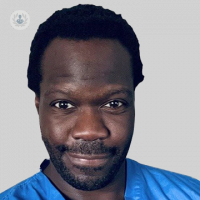Knee replacement surgery: How long can results last?
Written in association with:Knee replacement is a common surgical procedure that replaces a damaged or worn knee joint - commonly affected by osteoarthritis - with an artificial knee joint. This helps to relieve pain and increase mobility, increasing a patient’s quality of life.
Here to provide an expert insight into knee replacement surgery, including preparation, risks, and results, is Mr Tofunmi Oni, leading consultant orthopaedic hip and knee surgeon.

What are the different options for knee replacement?
For the most part, the options for knee replacement depend on:
- The type of wear and tear that patients have.
- The type of components that are added - a total knee replacement changes all the components that are worn whereas a partial knee replacement targets a specific area.
The decision on which knee replacement to have is jointly made after ordering all the relevant imaging and having an informed conversation with the patient. Treatment is tailored.
How should patients prepare for surgery? Is exercise or psychotherapy required beforehand?
Physiotherapy and exercise are not a requirement, but they are certainly beneficial. What they allow patients to do is to is to keep their muscles strong and ultimately help their recovery process after knee replacement.
Physiotherapy and exercise are something that I encourage most patients to do.
How is knee replacement performed and what are the risks involved?
Knee replacement, first and foremost, is performed under an anaesthetic. This is often something that patients worry about, but there is absolutely no pain of discovery during the operation.
The operation is performed with patients lying on their back. During surgery, an incision is made down the middle of the knee that reaches down to the knee components that are going to be changed. The relevant components are then attached to the knee components using a specific bone cement. Finally, the incision is closed.
In terms of risks, there are specific risks to big operations like this one, including bleeding, infection, or damage to the arteries or the veins. As well as these, there are specific risks to the artificial knee replacement. These include the components potentially coming loose in the future, or the components breaking the bone around it.
However, for the most part, the long-term results of knee replacements are extremely good based on current evidence.
What results can patients expect and how long do these last?
I think that, for the most part, results are extremely good. I believe that the primary aim of knee replacement surgery is to take the pain away and improve function, and most patients do have that.
In terms of how long results lasts, these are mechanical components that are being put into human beings. After 17 years, on average, roughly 90 per cent of patients will still experience the surgical benefits of the original knee replacement and will not have had a revision knee replacement. This is a good indication that knee replacement surgery has a good longevity.
If you are considering undergoing knee replacement surgery and wish to consult your options with an expert, do not hesitate to visit Mr Oni’s Top Doctors profile today.


